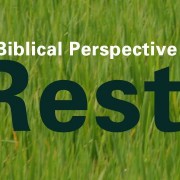Rest
Back in July of 2006, I did something I could not have imagined myself ever doing. I went on a cruise. We sailed out of Port Canaveral in Florida, and then headed down to Cozumel, MX, then on to Belize City, then over to Costa Maya in MX, then to Nassau in the Bahamas. It was a decadent experience, but it was fun. But I have to say I was glad to return to the world of routine and service to the Lord, free from the buffet lines of a cruise ship. I got very full. Way too full.
What can be gained from a time like that? Well for one, learning how to properly rest is a very important thing. In our frenetic, fast-paced society, we have far too little real rest. Rest is recuperation. Rest is revitalization. Rest is restorative. Rest provides perspective. Rest is a regrouping process. Rest is therapeutic. Rest is the non-activity or activity that accomplishes these ends. Rest can even include the absence of noise.
Many times in the past—when on vacation—I scurried around thinking that I needed to get in as much “fun” as possible. Driving here and there, doing this or that, I’d oftentimes have to come home and rest from my “rest.”
Consider the best Biblical definition or description of rest that I’ve been able to find in the Bible:
For he who has entered His rest has himself also ceased from his works as God did from His. (Hebrews 4:10)
That’s it! In the context of Hebrews, God is talking about the ability to stop trying to earn God’s favor. It’s the cessation of works which we think are meritorious (i.e., that “earn” our grace). Biblical rest is trusting wholly in Jesus Christ, and in what He has accomplished for us in His death, burial, resurrection, ascension, exaltation, and High Priestly ministry. It is the utter reliance upon God, with nothing coming from ourselves as a source of rightness or wholeness with God.
Taking that principle in the direction of how we should go about this business of resting, the implication is that we stop trying to do. We just are. We end our own efforts and we just settle down into a state of solitude, into a posture of peace. We trust God, knowing that it’s His will that we get restored, healed, rejuvenated, etc.
How much rest do we need? Well, the Bible teaches that a weekly dose is the minimum. One day a week. But then there are other periodic opportunities we can also take advantage of during any given year. Vacations, longer weekends, just about any time that God gives us.
As we remember rest’s purposes—and as we focus on and trust in the Lord to fulfill those purposes in our lives—we’ll be strengthened for the battles and ministry ahead of us. This is the time to serve the Lord! We need all the strength we can get. There are six other days in each week in which fellowship with God, life, service, family, struggles, trials, joys, and sorrows take place.
I’m trying to learn how to live in the moment. Trying to learn how to “be” where I am. Trying to learn to soak in the power and grace of God Himself. Trying to not have to be accomplishing something all of the time.
I must be making some progress … the other day after a busy morning at church I found myself in the kitchen with my wife. Nothing was on the immediate schedule, and I was able to just chill out. I was resting. I liked it.









